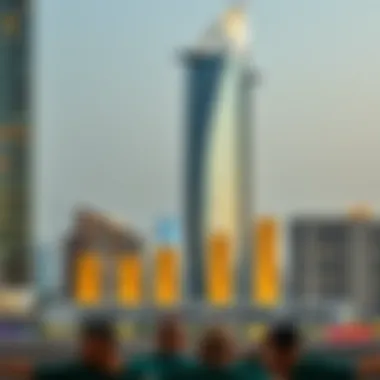Disadvantages of Living in the UAE: A Detailed Analysis


Intro
Living in the United Arab Emirates (UAE) often appears to be a dream come true for many expats and investors. The glitz of skyscrapers and the allure of luxurious lifestyles can easily distract one from the underlying challenges that come with such a vibrant lifestyle. Getting lured by the fascinating social media posts or the flashy promotional material, many forget to consider the daily realities that shape life in cities like Dubai and Abu Dhabi. Due diligence is essential not only for potential expatriates seeking new beginnings but also for those eyeing investment opportunities in this dynamic market.
This article aims to shed light on the various drawbacks of living in the UAE, sparing no detail in discussing how cultural adjustments, financial implications, and environmental factors can affect the lives of residents. Readers will uncover a plethora of vital insights that reveal the complexities of navigating life in this alluring but multifaceted region.
Market Trends
Understanding current market trends is crucial for anyone contemplating a move or investment in the UAE. The region's economy, while buoyed by oil revenues, is undergoing significant evolution.
Current Market Analysis
The real estate market in the UAE has shown fluctuations impact by international and local factors. A variety of economic forces—ranging from oil prices, global market trends, to changes in regulations—affect prices in housing and rentals. The average price of a residential property in Dubai sees regular oscillations, influenced by a plethora of elements like population growth and legislative shifts promoting foreign investments. Those looking to buy must be particularly mindful of prevailing market conditions.
- Current Features:
- Real estate offerings include premium lifestyles at a premium cost.
- High competition influences prices, often leading to inflated valuations.
Future Predictions
Looking ahead, the landscape of living in the UAE will likely continue evolving as more foreigners settle in. The buzz surrounding developments in technology and innovations in housing solutions promises a new horizon for residents and investors alike.
There are predictions regarding:
- Enhanced regulations that may stabilize the market in the long run.
- A potential downturn if external economic factors remain unfavorable.
"Living in the UAE means adapting to its changing rhythms, and those who embrace this reality are often the most successful."
Investment Opportunities
For many, the burgeoning economy of the UAE is enticing, offering a variety of investment avenues. However, one cannot overlook the intrinsic challenges that come along with the opportunities.
High-Return Areas
Certain neighborhoods stand out as being particularly lucrative for investment. Whether one is eyeing residential or commercial prospects, areas like Dubai Marina and Downtown Dubai hold significant potential. These regions boast an array of offerings, from luxury apartments to high-end office spaces, but are often matched with steep price tags. Real estate investors must weigh potential returns against the intrinsic costs of living in these sought-after areas.
Emerging Neighborhoods
Investors looking for untapped potential may want to explore emerging neighborhoods like Dubai South or Al Furjan. These areas, while still developing, show promise due to government-backed initiatives aimed at enhancing infrastructure and community living.
As with any investment, the key is to perform comprehensive research. A solid understanding of the environment, cultural nuances, and market fluctuations can significantly alter one's experience in the UAE.
Cultural Adjustments and Integration Challenges
Understanding the dynamics of living in the UAE requires more than just appreciating its glamorous lifestyle and towering skyscrapers. Cultural adjustments and integration pose a range of challenges that many expatriates face as they try to settle in. This topic sheds light on not just the surface-level differences but dives into the depths of emotional and social adaptation. For potential residents, especially investors and expatriates, being aware of these challenges is crucial for a smoother transition and better community integration.
Diverse Population and Cultural Clashes
The UAE is a melting pot of cultures, housing individuals from all corners of the globe. One might expect a harmonious blending of different customs; however, this diversity sometimes leads to cultural clashes. Traditional Emirati values often contrast with the practices of expatriates, resulting in misunderstandings. For example, an expatriate might inadvertently offend local sensibilities by not adhering strictly to dress codes or social etiquette during Ramadan.
These clashes can form barriers, making the integration process arduous. It’s essential for newcomers to engage in local customs, such as greeting in Arabic or participating in national celebrations. This involvement not only fosters goodwill but also helps in easing the transition. It’s often said, "When in Rome, do as the Romans do," a saying that couldn’t ring truer here.
Language Barriers
Language is often the first hurdle expatriates encounter. Arabic is the official language, but since English is widely spoken, many might assume it's not challenging to navigate. However, the absence of proficiency can lead to significant miscommunication in both personal and professional spheres. Take, for example, a Brit in Dubai who tries to explain a complex idea using casual lingo. Without a solid command of Arabic, nuances can be lost, which impacts relationships at work and in social settings.
Moreover, while English is common in some circles, various dialects and accents are prevalent, making it a chore for those unaccustomed to them. Thus, undergoing language training or learning basic phrases can ease interaction and help build connections.
Religious Practices and Observations
Religion plays a central role in the UAE's culture. The majority of the population practices Islam, and its influence permeates various aspects of daily life. Expatriates may struggle with these religious practices, especially during significant periods like Ramadan, when fasting and increased prayer become focal points for Muslims. For non-Muslim residents, this can pose a unique challenge, as dining out or drinking alcohol becomes regimented.
Understanding the importance of these practices is essential for coexistence. Taking simple steps, such as being respectful during prayer times, can make a huge difference. It shows appreciation for local customs and lays the groundwork for respectful interactions. In a place where a significant percentage of the population are expatriates, acknowledging these religious observances is vital for ensuring social harmony.
"In facing the challenges of cultural adjustments, one often finds the real richness of life in diversity."
In summary, navigating the cultural adjustments and integration challenges in the UAE requires a willingness to learn and adapt. The journey might be laden with hurdles such as cultural clashes, language barriers, and differing religious practices. Yet, every challenge can be met with understanding and effort, leading to a rewarding experience that adds depth to one’s life in this fascinating region.
Cost of Living and Economic Factors
When weighing the disadvantages of living in the United Arab Emirates, particularly in bustling cities like Dubai and Abu Dhabi, understanding the cost of living and economic factors is paramount. These aspects can wield substantial influence over both the day-to-day experiences and long-term financial stability of residents. Exploring various economic dimensions—from housing costs to health expenses—can shed light on the complexities of life in the UAE.


Housing Prices and Availability
Housing in the UAE often presents a dual-edged sword. On one hand, the allure of lavish skyscrapers and prime waterfront villas captivates many newcomers. On the other hand, the reality can be quite staggering. Rent prices here can feel like you're betting the farm; many expatriates discover that their housing costs consume a significant portion of their income.
The rental market is heavily influenced by factors like location and amenities. For example, a one-bedroom apartment in downtown Dubai might set you back upwards of AED 8,000 a month, while the same apartment in outer neighborhoods could be half the price. Similarly, purchasing property can invoke a game of roulette; market fluctuations can lead to investment risks, particularly for buyers enticed by the glossy marketing of developments that may not materialize as expected.
However, options do exist for the discerning buyer or renter. It often pays off to do your homework, as sticking to neighborhoods that align with both budget and lifestyle can yield favorable outcomes. Joining local forums on platforms like Reddit can also provide first-hand insights into hidden gems in the housing market.
Education and Healthcare Expenses
The costs surrounding education and healthcare are other facets that can hit expatriates hard. Families relocating to the UAE often prioritize high-quality education for their children, and private schooling tends to escalate quickly in expense. Monthly tuition at an international school can reach AED 5,000 or even higher. While the UAE government does provide some public schooling options, these often cater primarily to UAE nationals and may not meet the expectations of expatriate families.
Healthcare is similarly a mixed bag. The quality of medical facilities is generally high, comparable to first-world countries. Yet, without proper health insurance, the out-of-pocket costs can surprise many newcomers. Visits to specialists may come with hefty bills, and hospitals often require upfront payments unless covered by insurance. Health insurance premiums can also be steep, and this aspect should be factored into any budget consideration before making the leap to the UAE.
Transportation Costs
Navigating the urban landscapes of the UAE can also present financial challenges. While cities like Dubai boast a robust public transport system, including the Metro and buses, many residents still lean towards cars for convenience. The costs associated with car ownership can pile up fast: insurance, fuel, maintenance, and parking fees are just the tip of the iceberg. Gas prices are relatively low compared to western nations, yet the initial purchasing cost of a vehicle may sting significantly.
Alternatively, if choosing public transport, monthly passes can ease the burden but still add another layer to the monthly expenses. Moreover, the erratic traffic congestion common in major cities can cause lost time, which in turn equates to lost productivity and potential income.
Access to affordable transportation can be a double-edged sword for many residents, often leading to increased travel times amid the hustle and bustle of UAE city life.
Climate and Environmental Concerns
Living in the United Arab Emirates comes with its share of climate and environmental factors that significantly impact the lifestyle and well-being of its residents. As bustling urban centers like Dubai and Abu Dhabi continue to grow, there are vital considerations around climate conditions, air quality, and water resources that cannot be overlooked. Understanding these aspects is crucial for both potential expatriates seeking a new home and investors eyeing opportunities in the region.
Extreme Weather Conditions
One of the most prominent aspects of the UAE's climate is its extreme heat, particularly during the summer months. Temperatures can easily soar above 40 degrees Celsius (104 degrees Fahrenheit), often accompanied by high humidity levels. For newcomers, this might feel like stepping into an oven each time one walks outside, creating significant challenges for daily activities.
Residents must adapt their routines to avoid the harsh midday sun. Outdoor events frequently take a back seat during the summer, as the oppressive heat makes even short outings uncomfortable. It’s not uncommon to see people scheduling their walks or jogs for the early morning or evening hours, when temperatures dip to more bearable levels.
Additionally, the climate can lead to health issues, particularly for the vulnerable populations such as the elderly or those with existing health conditions. Heat-related illnesses can escalate quickly and may necessitate regular health check-ups, adding to the living costs.
Air Quality Issues
Air quality can also be a notable concern in the UAE, particularly in urban environments. Dust storms are a common occurrence, which can significantly affect the air quality, leading to respiratory issues. The high volume of vehicle traffic, coupled with industrial activities, contributes to elevated levels of air pollutants such as particulate matter and nitrogen dioxide.
Residents often find themselves taking measures to mitigate these air quality challenges. This can include investing in air purifiers or avoiding outdoor activities during times when the air quality index indicates high pollution levels. Asthma and other respiratory illnesses have been on the rise, particularly among children and the elderly. For investors, these chronic health considerations may pose potential liabilities in the long run.
"Understanding the local climate and environmental conditions can deeply influence both lifestyle and health."
Water Scarcity and Conservation Efforts
Water scarcity is another pressing issue in the UAE, a region characterized by its arid desert climate. With minimal natural freshwater resources, the country heavily relies on desalination plants to fulfill its water needs. While this is a technological marvel, it also raises concerns related to sustainability and the environmental impact of such processes.
The government has implemented various conservation initiatives aimed at encouraging residents to be mindful of water usage. From restrictions on irrigation to awareness campaigns promoting water-saving techniques, the UAE is pushing towards a more sustainable model, albeit with mixed success.
However, restrictions can lead to frustrations for some residents, especially those used to more liberal water usage practices. The need for vigilance in conserving water might seem daunting, particularly in a climate where temperatures continually demand hydration.
Social Limitations and Legal Restrictions
Living in the United Arab Emirates provides many advantages, yet beneath the glittering surface lies a framework of social limitations and legal restrictions that can significantly influence one’s daily life. Understanding these challenges is crucial for anyone considering relocating to the UAE, whether for investment, work, or just a new adventure. Acknowledging the complexities in these areas helps prospective residents navigate their choices and expectations more aptly.
Restrictions on Freedom of Expression
In the UAE, freedom of expression is not as broad as in many Western countries. Publicly criticizing the government or local rulers can lead to serious consequences, including fines and even imprisonment. This is a notable concern for expatriates and locals alike. Social media can be a landmine; posts that may seem harmless can be interpreted as defamatory or inappropriate. For instance, comments about local customs or culture, even if made in jest, could land one in hot water.
Moreover, the country's laws governing online behavior are strict. The Cybercrime Law imposes penalties for actions deemed to tarnish the reputation of the nation or its leaders. Many residents maintain a cautious approach, often opting to keep opinions to themselves in public forums.
The importance of this restriction has implications not only for personal expression but also for open dialogue in workplaces and community settings. Some expatriates find this culture stifling, leading to feelings of isolation, especially when surrounded by diverse opinions from back home. Knowing these boundaries in advance can help a new resident temper expectations and adapt more smoothly to the local environment.
Workplace Rights and Labor Laws
While the UAE offers an impressive work environment with numerous opportunities, potential employees should be aware of the complexities and limitations surrounding workplace rights and labor laws. Labor regulations exist, but enforcement can be inconsistent. For instance, workers might encounter issues like delayed salaries or lack of comprehensive health insurance—even in high-paying positions.
Expatriates, in particular, are subject to the sponsorship system, known as "kafala," which ties workers’ residency permits to their employers. This system can create a power imbalance, as leaving an employer without proper permission can lead to deportation. The lack of a consistent grievance mechanism may deter workers from challenging unfair treatment, fearing job loss or worse.
Moreover, not all sectors uphold the same level of regulations, which can leave workers in lower-tier jobs vulnerable. Recognizing these challenges beforehand can help potential employees make informed decisions about their career paths and negotiate better employment terms before arriving in the UAE.
Family and Social Networking Constraints
For many expatriates, relocating to the UAE means leaving family and friends behind. Establishing a social network can prove to be quite a task due to cultural norms and expectations. Connections often rely heavily on workplace relationships or community groups, which can take time to develop. The social scene can sometimes feel cliquish, especially if one does not align with similar cultural backgrounds.


Additionally, family life is guided by traditional values, which can create challenges for those with different cultural perspectives. Public displays of affection, for instance, are frowned upon and can lead to legal troubles. Parents may find it difficult to integrate into local school systems if their children do not fit the cultural mold that schools often promote—balancing Western educational values while adapting to local standards can be tricky.
The social landscape can be rewarding but may feel constraining for some. It's paramount for newcomers to understand local social expectations thoroughly. Building a supportive community can significantly ease the transition and enhance one’s experience living in the UAE.
In summary, the social limitations and legal restrictions present in the UAE shape not just day-to-day experiences but also long-term adjustments, highlighting the need for awareness and adaptability in navigating this complex environment.
For more details about this topic, check out Wikipedia on UAE Laws.
By understanding these nuances of living in the UAE, potential residents can prepare themselves better and approach their new life with open eyes.
Health and Lifestyle Considerations
The topic of health and lifestyle is a crucial aspect when evaluating the challenges of living in the UAE. The fast-paced environment can be enticing, but it brings along significant pressures that affect both physical health and mental well-being. Understanding these factors helps prospective residents make informed decisions.
Healthcare Quality and Accessibility
Healthcare in the UAE is of a mixed standard and can vary widely between facilities. Generally, hospitals in cities like Dubai and Abu Dhabi offer high-quality medical services, often on par with Western countries. However, accessibility can be an issue. Health insurance is mandatory, yet the cost can be steep, especially for expats, which might limit the choices available to them.
Emirates like Dubai boast state-of-the-art medical facilities, yet many providers require upfront payment upon receiving services if insurance isn't covered. This can lead to unexpected financial strain, especially for families with children or elderly parents needing regular care. Moreover, long wait times for specialized treatments could be a concern, emphasizing the importance of planning for healthcare needs well in advance.
Lifestyle Diseases and Mental Health
The hustle and bustle of city life can contribute to a rise in lifestyle-related health issues. The UAE has seen an uptick in conditions such as obesity, diabetes, and hypertension. With a diet often heavy on processed and fast foods, along with a stark lack of outdoor activity due to the hot climate, maintaining a healthy lifestyle can be a struggle for many.
Mental health also deserves attention. The UAE's culture prioritizes success, which can lead to immense pressure. According to a study from the World Health Organization, the stigma surrounding mental health in Arab societies often hampers individuals from seeking help. Consequently, many might suffer in silence, exacerbating issues like anxiety and depression. Support networks may not be as readily available as back home, making it essential for newcomers to seek communities that emphasize mental well-being.
Work-Life Balance Challenges
Achieving work-life balance in the UAE can often feel like a myth rather than a reality. The expectation to work long hours is ingrained within many industries, often blurring the line between professional and personal time. Many expatriates find themselves caught in the grind, struggling to maintain social lives or family time amidst demanding work commitments.
"Life in the UAE can easily morph into a routine of work, eat, sleep, repeat."
This statement resonates with many who navigate their professional lives in the bustling Emirates. Taking time off can often be complicated by workplace cultures that favor overworking. Regular vacations or personal time are seen as luxuries rather than necessities.
For more insights, you might find relevant information at WHO and UAE Government.
Stay informed and prepare to adapt to the dynamic life in this unique landscape.
Education System Limitations
The education system in the UAE exhibits notable strengths but also harbors certain limitations that warrant discussion. Understanding these discrepancies is crucial for expats, investors, and educators alike, especially as many families relocating to the UAE seek educational opportunities that align with global standards. While there are many international schools and academic institutions designed to cater to diverse populations, the interplay of regulations, curricula, and accessibility often complicates the landscape.
Access to Quality Education
Access to quality education in the UAE varies dramatically depending on several factors, including location, income level, and nationality. Urban centers like Dubai and Abu Dhabi offer numerous reputable institutions, but they often come with hefty price tags. In many cases, private schools are the primary option for expatriates since public schools predominantly cater to Emirati students and follow different curricula.
Moreover, the waitlists for certain prestigious schools can be long, making it challenging for newcomers to secure a spot for their children. Many families find themselves navigating a complex maze of admissions processes, which can be both time-consuming and stressful.
- High Tuition Fees: Tuition can reach exorbitant levels; families may need to plan their budgets meticulously.
- Limited Options for Lower-Income Families: Affordable education options may not offer the same quality or diverse curriculum found in more expensive institutions.
When looking for education for their children, families must weigh these factors keenly, ensuring that their investment yields significant returns in educational quality.
Curricula Variability and Standards
Curricula can be a mixed bag in the UAE. Schools offer a range of programs including British, American, International Baccalaureate, and even the Emirati National Curriculum. While this variety allows families to select the best-suited educational path, it also leads to a lack of uniformity in educational standards.
Parents may grapple with questions regarding the effectiveness of different curricula. Furthermore, disparities in teacher qualifications and resources among schools can create significant gaps in educational excellence. Therefore, families need to conduct in-depth research before choosing a school, paying attention to educators’ backgrounds and institutional reviews.
Some notable points include:
- Accreditation: Not all schools hold recognized accreditations, leading to varying quality levels.
- Cultural Relevance: Some curricula may not adequately address local culture, impacting students' social integration.
In this landscape, parents are advised to prioritize schools that demonstrate a well-rounded scheme of educational standards, preparing students not just academically but socially as well.
Extracurricular Opportunities
Extracurricular opportunities are an essential aspect of a complete education, providing students with avenues for personal growth and skill development. However, in the UAE, these opportunities can be rather limited depending on the institution and local factors.
Some schools emphasize extracurriculars like sports, arts, and community service, while others may deprioritize them, focusing more on academics. This lack of uniformity can impact students’ holistic development, which is crucial for their overall happiness and fulfillment.
Several aspects to consider are:
- Diversity of Activities: Some students have access to extensive clubs and sports teams, while others may not.
- Cost Implications: Participation in many extracurricular activities commonly incurs additional fees, creating another financial hurdle for families.
> Investing in education should not merely be about securing good grades but also about fostering well-rounded individuals.


In summary, the education system's limitations in the UAE reflect a complex tapestry that potential expatriates must navigate. The blend of opportunities and challenges calls for a thoughtful approach tailored to each family’s unique circumstances and aspirations.
Transportation Infrastructure Challenges
Transportation is a critical artery of any city, where urban life can either flourish or flounder depending on how well it is managed. In the UAE, especially in bustling hubs like Dubai and Abu Dhabi, the emphasis on infrastructure is palpably evident. However, there are significant challenges that arise, influencing not only daily commutes but also overall quality of life for residents. Understanding these issues becomes essential for anyone considering moving or investing in this region.
Public Transport Limitations
Despite the iconic tram system and expanding metro lines in cities like Dubai, the public transport options are still limited compared to other global cities. For example, not all areas are accessible via public transport, resulting in situations where residents need to rely on personal vehicles to get around. This limitation often makes it tough for newcomers to adapt, particularly for those who have grown accustomed to more comprehensive public transport systems in other parts of the world.
- Metro Coverage: The metro in Dubai, although modern, doesn’t reach every neighborhood. Suburban areas might be underserved, leading to longer travel times.
- Buses and Trams: While buses do connect many locations, the frequency and punctuality are often criticized. Some routes may also be infrequent, especially during non-peak hours.
- Relying on Taxis: Many residents end up using taxis or ride-hailing services, which, while convenient, can quickly add up in costs and become an economic burden on monthly expenses.
Traffic Congestion Issues
As the population continues to swell in the UAE, traffic congestion has emerged as a daunting problem. The road networks, though lavishly constructed, struggle under the weight of an increasing number of vehicles.
According to a report by the TomTom Traffic Index, Dubai consistently reports high levels of traffic congestion, ranking among the most congested cities globally.
- Rush Hour Woes: Morning and evening rush hours can be particularly daunting, with certain roadways becoming nearly impassable.
- Government Efforts: While authorities are investing heavily in road expansions and smart traffic management systems, these solutions often lag behind the rapid population growth.
- Long Commutes: Daily commuters may find themselves spending well over an hour just to cover a few miles, reducing their overall quality of life.
Safety Concerns on the Roads
Driving in the UAE can be a double-edged sword. The roads are typically wide and well-maintained, yet they also present a veneer of safety that masks considerable risks. The truth is, accidents are surprisingly common, influenced by various factors.
- Speeding Culture: There’s a prevalent culture of speeding and aggressive driving, which can make even experienced drivers cautious. Unfortunately, it often leads to accidents.
- Driving Under Stress: The combination of traffic congestion, time pressures, and the heat can lead to stressed drivers making impulsive decisions behind the wheel.
- Regulations and Enforcement: While there are strict laws and high fines in place, enforcement can sometimes be inconsistent, leading many to question their effectiveness.
In summary, while the UAE boasts impressive infrastructure accomplishments, challenges remain. Navigating public transport limitations, traffic congestion issues, and safety concerns on the roads is crucial for potential investors, agents, and buyers. Those who focus on these realities will be better equipped to adjust and thrive in the vibrant yet complex landscape of life in the UAE.
For more details, visit Wikipedia, Britannica, or relevant forums on Reddit.
Real Estate Market Fluctuations
The real estate sector in the United Arab Emirates, particularly in extravagant locales like Dubai and Abu Dhabi, is a significant marker of the broader economic environment. This market is characterized by rapid growth and astonishing peaks, as well as steep declines. Thus, understanding the fluctuations is paramount for anyone thinking of investing, renting, or even just buying a home there. The market's trajectory can affect everything from property prices to rental rates, influencing both expat lives and investment success.
Market Volatility and Investment Risks
The phrase "what goes up must come down" rings especially true in the UAE property market. After years of rampant growth, recent trends have shown considerable volatility, which carries inherent risks for investors.
- Investment Peaks and Dips: Investors often feel the heat during sudden market dips. These downturns can lead to significant financial losses, making it crucial for prospective buyers to time their investments. With prices swinging wildly, some may find themselves underwater on mortgages or rentals, forcing them to rethink their financial strategies.
- Speculative Nature of Investments: Many buyers get lured by the thought of quick profits which can lead to poor investment choices. Investors who fall into the trap of speculation without thorough market analysis may find themselves deeply regretting their decisions. It’s vital to conduct thorough research and consult with real estate experts who know the lay of the land.
In essence, the thrill of potential gains can easily turn to anxiety in a market this unpredictable.
Regulatory Changes Impacting Buyers
Government regulations play a massive role in shaping the residential and commercial real estate landscape. Buyers must stay informed as these can swing like a pendulum, altering the entire perception of property investment in the UAE:
- New Ownership Laws: Recent changes to foreign ownership regulations have opened new avenues, yet they come with their own set of rules and small print. Not knowing these regulations can result in major headaches for buyers.
- Fees and Taxes: The introduction of new fees and taxes may seem trivial but can drastically affect overall investment returns. Many buyers overlook these hidden costs, leading to unpleasant surprises down the line. It's essential for investors to read between the lines and understand the true cost of ownership before diving in.
Given this landscape, a thorough comprehension of legal and financial obligations can arm buyers against unforeseen challenges.
Housing Market Saturation
There are whispers in the corridors of real estate about housing market saturation within the UAE, particularly in popular areas. This phenomenon arises when supply significantly outstrips demand, bringing several implications:
- Price Stability: Saturation can lead to a leveling off or decline in property prices, drawing in a crowd of buyers looking for a better deal. However, over time, this can result in stagnant or depreciating values, creating less incentive to invest.
- Rental Demand and Yield: Saturated markets dilute rental demand. Landlords may find it harder to keep properties occupied, leading to a potential drop in rental income. This shift forces property owners to reevaluate rental rates, which can create ripples throughout the surrounding market.
"The housing market is like a delicate balancing act: too much weight on one side could send it crashing down."
In terms of real estate market fluctuations within the UAE, it’s essential to keep a keen eye on these dynamics for informed decision-making. Buyers, especially, should approach the property market with care, balancing their aspirations with the realities that lie ahead.
Closure: Weighing the Pros and Cons
Living in the UAE is like navigating a double-edged sword; on one side, there are attractive benefits, while on the other, there are substantial drawbacks. To make the best possible decision for potential expatriates, investors, and long-term residents, a thorough examination of the pros and cons is essential. This part of the article underscores the importance of recognition of both the appealing aspects, such as luxurious lifestyles and tax benefits, and the challenges, like the cost of living and cultural adjustments.
When considering a move to the UAE or investing in the region, understanding these dynamics becomes crucial. It’s not just about what glimmers; it's about the hidden facets that might not make the brochure highlights. Evaluating the costs against the potential lifestyle benefits will inform better, more strategic decisions and can help prevent unwelcome surprises.
Assessing Living Preferences
Everyone has their own criteria for choosing where to live, and the UAE isn't a one-size-fits-all solution. The key lies in assessing what you value most.
- Cultural Exposure: Some might thrive in the UAE's melting pot of cultures, while others may feel challenged by cultural differences. It's important to consider whether you prefer a predominantly Westernized environment, as seen in places like Dubai, or a more traditional atmosphere, like in Sharjah.
- Community Feel: Urban settings in UAE can sometimes feel disconnected. If community is a priority for you, finding neighborhoods that foster social interactions and connections might be necessary. Think about what makes a place feel like home for you.
- Lifestyle Choices: The UAE offers many amenities but at a price. Determine whether the luxury lifestyle is a necessity or if you’d be happier in a more modest setting. This reflection helps align location choices with personal lifestyle goals.
Making Informed Choices
Once you have grasped your preferences, making informed choices depends on diligent research and a realistic notion of life in the UAE. Here are some practical tips:
- Network and Learn: Engage with current residents through platforms like reddit.com or local Facebook groups. People often share their genuine experiences, which can provide valuable insights into daily life.
- Financial Planning: Understand the cost of living comprehensively—housing, schools, transportation, and health care. Websites such as government sites can provide reliability when seeking out living costs.
- Cultural Understanding: Learning about local customs, traditions, and legalities could be a game-changer when transitioning into UAE life. Resources like en.wikipedia.org can offer a basic framework of expectations and norms.
- Trial Periods: If possible, consider a trial stay. Rent month-to-month to see if the lifestyle fits your needs before committing to longer leases. This approach helps clarify if you’re happy to call the UAE home for the long haul.
By weighing the pros and cons critically and utilizing all available resources, individuals can navigate the complexities of living in the UAE more adeptly. Not only does this process help in minimizing potential regrets, but it delivers clarity and confidence in making a life-changing decision.











